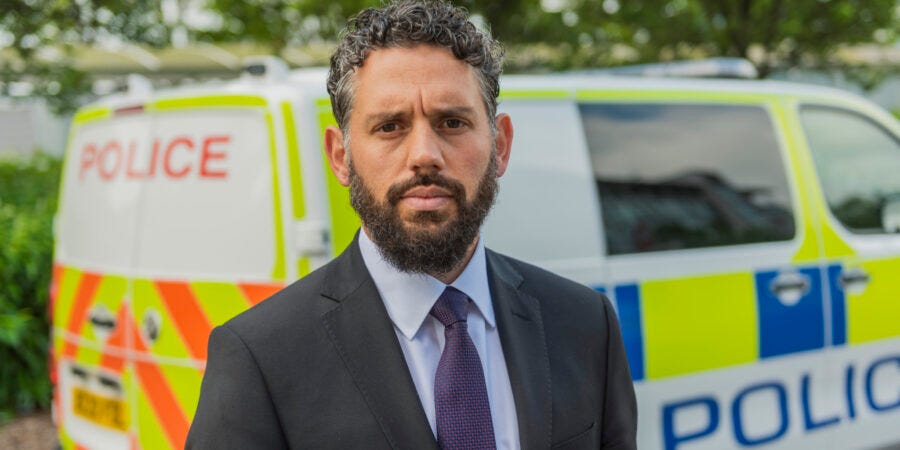West Midlands Police - the latest spring-board for ambitious politicians. Is the PCC’s office undermining the Police?
The Assistant Police and Crime Commissioner (PCC) for the West Midlands has his eyes set on Parliament.
Counter Cut’s content this month is sponsored by The New Talbot.
The Assistant Police and Crime Commissioner Tom McNeil has announced his intention to secure the Labour Party nomination in Northfield Constituency. An internal selection process is expected to take place in the coming weeks.
Having served as the Assistant Police and Crime Commissioner for just one year, Tom McNeil’s bid for Parliament may come as a surprise to some so early into his new role. However, those who follow the region’s politics closely will recall that McNeil boasts two unsuccessful Parliamentary elections for the Meriden Constituency, having contested the Conservative safe seat in 2015 and 2017.
McNeil enters a hotly contested selection process of hungry young candidates desperate to take on Gary Sambrook, the incumbent Conservative MP who won the seat in 2019. With Sambrook sitting on a majority of just 1,640, it promises to be a close-run contest.
With McNeil’s intentions now public, frustration is mounting that the Police Force is being used to further the careers of ambitious politicians.
Police and Crime Commissioners, established in 2012 as a new mechanism to hold Police Chief Constables to account, replaced the former Police Authority model.
PCCs are directly elected in a 4 year cycle, opening the door to political parties vying for oversight of regional policing. Despite the political interest, the PCC election here saw a turnout of just 31.02% in 2021, up from an even lower 27.7% in 2016. It is notable that 20,000 fewer votes were cast in the PCC election than the Mayoral, despite both elections taking place on the same day.
Turnout that low could be an indication of apathy towards policing, but given ‘crime’ polls consistently as one of the most important issues facing the country (YouGov), a more plausible explanation could be a lack of understanding over what the PCC actually does.
Giving directly elected politicians oversight of policing has had the inevitable effect of attracting politicians, rather than those with a deep understanding of policing, to the role.
It has also led to the inevitable outcome of combative activist PCCs, more interested in criticising the Government to lay the foundation for the next Local or General Election than working constructively with the Home Office to bring down crime.
In the West Midlands, the Labour Police and Crime Commissioner Simon Foster holds back no punches in his rhetoric about the Conservative Government, nor does his political role require him to.
But given the public’s lack of awareness of the separation between the political PCC and the apolitical Police Force, the independence and neutrality of the Police is called into question by association.
Counter Cut spoke to Cllr Alex Yip (Cons, Wylde Green), Shadow Cabinet Member for Social Justice, Community, Safety and Equalities on Birmingham City Council. He told us his thoughts;
“PCCs have not been been helpful for local policing. In the West Midlands, our PCC has spent millions on their PR and office refurbishment instead of making a real front line difference to residents who have no choice but to pay an extra precept for the privilege. He has brought in politics unnecessarily and brought in a couple of amnesty boxes when he should be focussed on supporting the police service and holding them accountable, not wasting energy on whether stop-and-search is politically correct.
“Every appointment made in the PCCs office has come from the Labour Party and with his Assistant now running for Parliament, it is obvious that these roles are being handed out to ambitious Labour Party insiders who are more interested in furthering their own careers instead of focussing on the job.
“We support calls to combine the PCC and the West Midlands Combined Authority to make it more efficient and cost effective for taxpayers.”
Some commentators argue that using the Police as a platform to boost one’s political career is damaging to trust in the Police itself, especially West Midlands Police which has the lowest levels of trust and confidence amongst its regions residents than anywhere else in the country. Army veteran and the Conservative Candidate for the West Midlands PCC election in 2021, Capt. Jay Singh-Sohal, told us;
“The biggest challenge facing any PCC or candidate is justifying why the role is important and how it can help tackle high levels of crime in the West Midlands. Residents continue to be sceptical about the PCC so seeing headlines referring to ‘top Police Chiefs’ running for Parliament or bitterly attacking the Government only damages the apolitical status of police officers”.
“Without greater public awareness of what the PCC’s Office does, seeing headlines referring to ‘top Police Chiefs’ running for Parliament or attacking the Government are hugely damaging to the apolitical status of the Police”.
The Birmingham Post and Birmingham Mail have referred to the PCC or his Assistant as “Police Chiefs” in print and online in recent weeks, a title most commonly used within the Police Force implying a senior operational role.
Capt. Singh-Sohal also highlighted Mr McNeil’s use of social media;
“I'm concerned that there is a gross politicisation of the office and a conflict of interest in the PCC's official social media account [@WestMidsPCC] regularly sharing posts and content from the personal account of it's Assistant PCC, a role which is not meant to be political.
“Residents who continue to see annual rises to the cost of policing in their council tax bill will want to know whether they are being best and fairly served, or whether the Office of PCC that they fund is now merely a springboard for wannabe politicians."
Mr McNeil’s twitter bio states his role as the “Assistant Police and Crime Commissioner”. The top of his profile shows a pinned tweet reading “I’m excited to announce I’m running to be the next Labour & Co-operative Party parliamentary candidate for Northfield”. His wider tweets blend his work as the Assistant PCC’s Office and his political activism seamlessly.
The PCC and his Deputy regularly attend and promote Labour Party events and were often seen on the campaign trail in this summer’s local elections endorsing their party’s candidates.
Both Mr Foster and Mr McNeil are within their rights to do so, but with many people unfamiliar with the PCC’s role, such a blurring of lines between politics and the Police risks eroding trust in the independence of our Police force.
With a blurring of lines between the PCC and Chief Constable, it comes as no surprise that since the creation of Police and Crime Commissioners (and their Assistants) in 2012, there have been repeated calls for the position to be scrapped. A report by Lord Stevens, former Met Police Commissioner (commissioned by the Labour Party), highlighted the “fatal systemic flaws” in the PCC model and called for them to be scrapped. In 2013, Former Labour Home Secretaries Alan Johnson and Charles Clarke joined the chorus.
Indeed, even the first PCC for the West Midlands, the late Bob Jones, recommended his own redundancy. He wrote; “after nine months in the job, I see no evidence that police and crime commissioners are an improvement on the previous police authorities”.
It remains to be seen whether Mr McNeil is successful in his bid to secure the Labour nomination in Northfield, but - win or lose - questions will continue to be asked about his commitment to his current position.
This article is written by Dominic Stanford. You can follow Dom on Twitter: @DominicStanford
Counter Cut’s content this month is sponsored by The New Talbot. Enjoy traditional curried, mixed grills and speciality starters that you won’t find elsewhere. Enjoy an extensive range of drinks from draught beers to delicious cocktails.
If you are interested in sponsoring our content, please contact editor@countercut.co.uk




